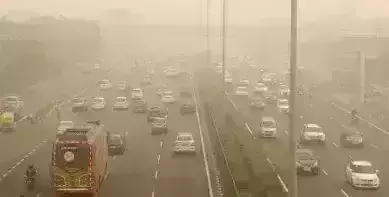
Delhi's air quality improves slightly from 'severe' to 'very poor'
text_fieldsNew Delhi: A visible improvement in Delhi's air quality was recorded on Sunday although it was in the ''very poor'' category, a marginal improvement from the 'severe' category.
According to the India Meteorological Department, the pollution level in many places of Delhi was less on Sunday than the previous days.
Meanwhile the city's Environment Minister Gopal Rai said his government will submit a lockdown proposal to the Supreme Court on Monday to reduce pollution further.
As per reports, the analysis of visibility observations showed that at IGI Airport, the visibility remained at 1,500-2,200 metres.
The drop in moisture continued while winds have been mostly calm throughout the day.
At 8 p.m., the Air Quality Index (AQI) at Anand Vihar was 398; Ashok Vihar 360; Chandni Chowk 324; Dwarka 344; Mandir Marg 321; IGI Airport 316; Lodhi Road 295, and Rohini 394, which according to the Central Pollution Control Board was "very poor".
An AQI between zero and 50 is considered 'good', 51 and 100 'satisfactory', 101 and 200 'moderate', 201 and 300 'poor', 301 and 400 'very poor', then 401 and between 500 is considered 'severe'.
The Supreme Court had on Saturday termed the rise in pollution levels an "emergency situation" and suggested clamping a lockdown in the national capital.
The Delhi government has already announced the closure of physical classes in schools, colleges and other educational institutions, except those where exams are being conducted, for a week from Monday.
All government offices, agencies and autonomous bodies, except those involved in essential services, have been directed to ask employees to work from home. No construction and demolition activity is allowed in the capital till November 17.
The Commission for Air Quality Management (CAQM) has asked Haryana, Rajasthan and Uttar Pradesh to consider implementing similar restrictions to contain spiralling air pollution levels.
The state governments and district administrations in the National Capital Region have also been suggested to issue a ''citizen charter/advisory'' for the public on steps that need to be taken during various stages of the Graded Response Action Plan (GRAP).























